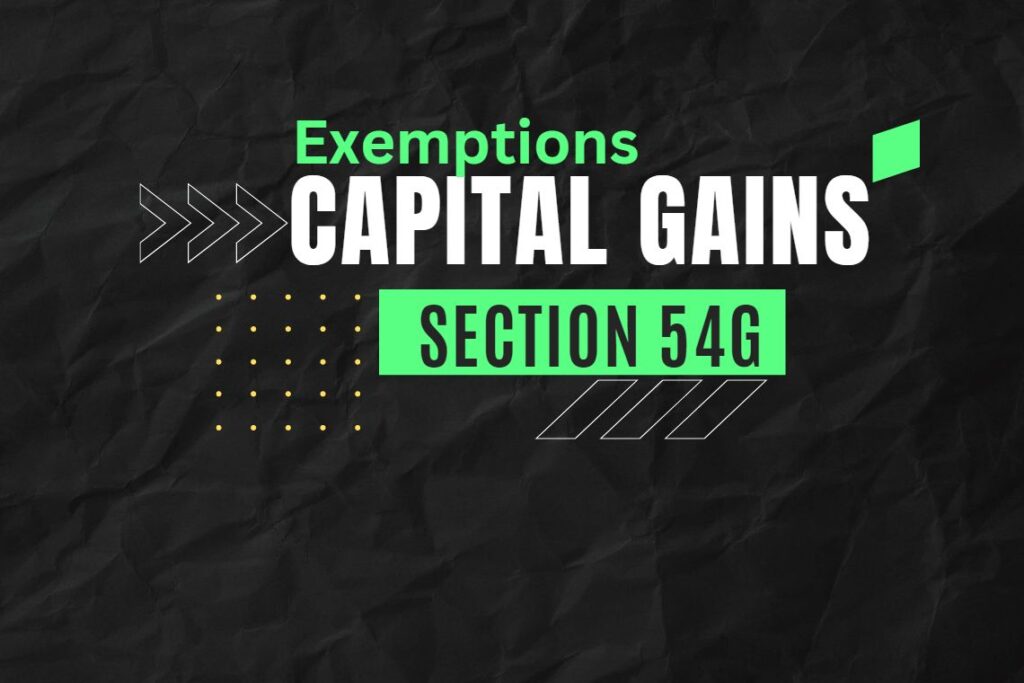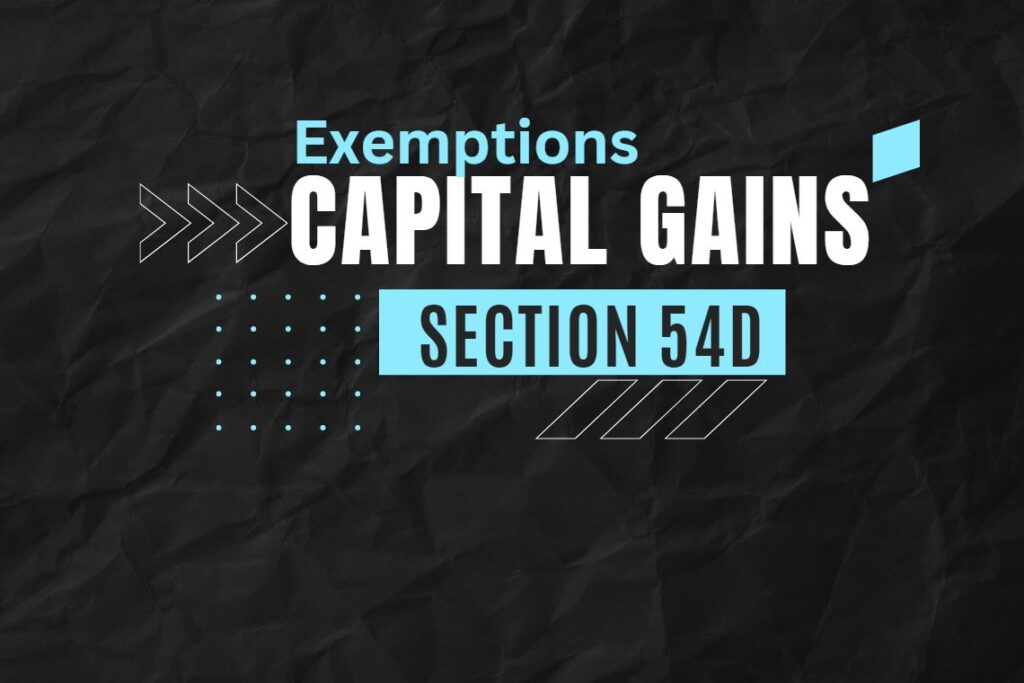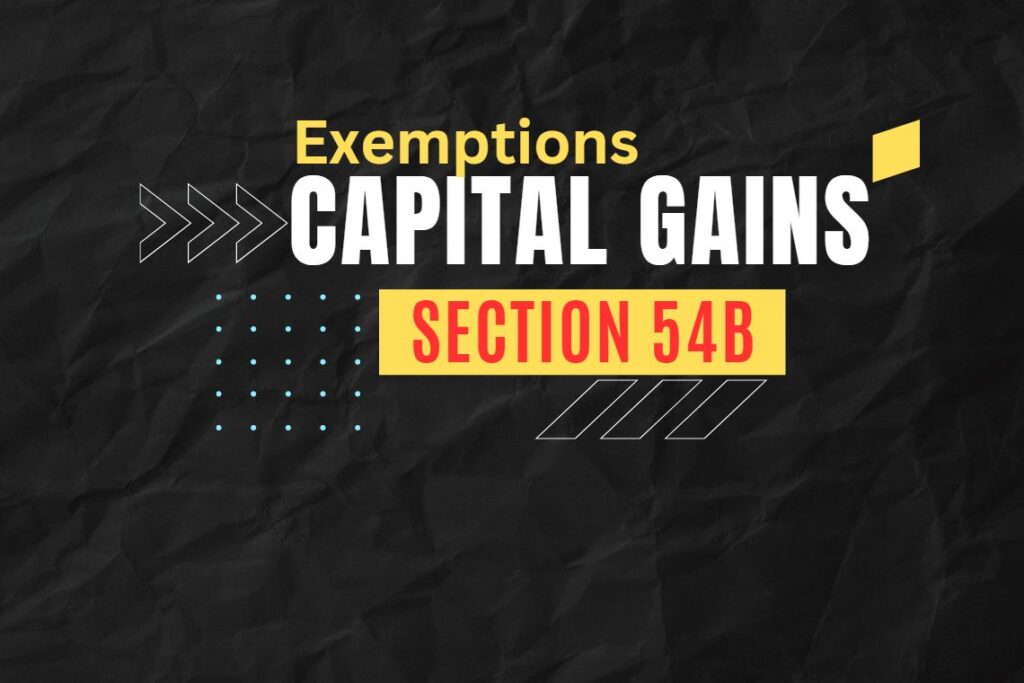Section 54GB of the Income Tax Act, 1961 in India provides for the exemption of long-term capital gains tax arising from the sale of a residential property when the capital gains are invested in a specified small or medium enterprise (SME). This section encourages individuals to invest in SMEs and thereby promote economic growth.
Section 54GB provides rollover relief from long-term capital gains tax to an individual or an HUF from sale of a residential property (house or plot of land) proportionate to the net consideration so invested in the equity of a new start-up SME company in the manufacturing sector which is utilized by the company for the purchase of new plant and machinery.
1. Application of Section 139(1)
As per Section 54GB, any capital gain arising to an individual or HUF from the transfer of a long-term capital asset being a residential property (a house or plot of land) shall be exempt proportionate to the net consideration price so invested in the subscription of equity shares of an eligible company before the due date of furnishing the return of income under Section 139(1).
2. Essential Conditions to be satisfied:
The above exemption shall be allowed if the following conditions are satisfied:
(i). There should be a long-term gain from the transfer of a residential property (i.e., a house or plot of land).
(ii). Such long-term capital gain should arise to an individual or HUF.
(iii). The amount of net consideration should be utilized by the individual or HUF before the due date of furnishing of return of income under section 139(1), for subscription in equity shares of an eligible company (hereinafter referred to as company). If the full amount of net consideration is not utilized for subscription in equity shares, the exemption shall be allowed proportionate to the amount so invested.
(iv). The amount of subscription as share capital is to be utilized by the company for the purchase of new asset (eligible plant and machinery) within a period of one year from the date of subscription in the equity shares.
(v). The equity shares of the company or the new asset acquired by the company should not be sold or otherwise transferred by the individual/I-TUF or the company, as the case may be, within a period of 5 years from the date of their acquisition.
However, where a computer or computer software is acquired by an eligible start up, the above restriction of 5 years has been reduced to 3 years.
(vi). The exemption will be available in case of any transfer of residential property made on or before 31.3.2022 in case of an investment in eligible start up instead of eligible small or medium enterprise.
3. Consequence if equity shares or new asset is transferred within a period of 5 years from the date of its acquisition:
(a) If the equity shares acquired by the individual or HUF are sold or otherwise transferred within a period of 5 years from the date of its acquisition, the capital gain shall arise as under:
(i) the capital gain arising from the transfer of equity shares shall be taxable in the previous year in which such shares are transferred, which can be short-term or long- term depending upon the period of holding.
And
(ii) the amount of capital gain arising from the transfer of residential property not charged under section 45(1) earlier shall be deemed to be the long-term capital gain of the previous year in which such shares are sold or otherwise transferred and hence taxable.
(b) Similarly, if the new asset (eligible plant and machinery) is sold or otherwise transferred by the company within a period of 5 years from the date of its acquisition, the capital gain shall arise as under:
(i) the capital gain, if any, arising from the transfer of such asset will be taxable in the hands of company, which will be short-term as asset is a depreciable asset forming part of block of asset,
And
(ii) the amount of capital gain which was exempt under section 45(1) earlier shall be taxable as long-term capital gain in the hands of such individual or 1-JUF in the previous year in which such asset (eligible plant and machinery) is sold or otherwise transferred.
4. Capital Gain Scheme Also Applicable:
If the amount of net consideration which has been received by the company for the issue of equity shares by the individual or HUF is not utilized by the company for the purchase of a new asset (eligible plant and machinery) before the due date of furnishing the return of income under section 139, the unutilized amount should be deposited before the said due date under a deposit scheme, notified by the Central Government in this behalf and the return furnished by the assessee shall be accompanied by proof of such deposit having been made.
The amount so utilized and the amount so deposited in the deposit scheme shall be deemed to be the cost of a new asset (eligible plant and machinery).
5. Consequences if the amount Deposited in Deposit Scheme is Not Utilized for Purchase of New Asset:
Where the amount so deposited in deposit scheme is not utilized, wholly or partly for the purchase of new asset within a period of one year from the date of subscription in equity shares by the individual or HIJF, then the difference between:
(a) the exemption allowed under section 54GB earlier;
And
(b) the exemption that should have been allowed based on the amount actually utilized, in the purchase of new asset (eligible plant and machinery),
shall be taxable as long-term capital gain in the hands of individual or HUF in which the period of one year from the date of subscription in equity share by the assessee expires and the company shall be entitled to withdraw such amount in accordance with the scheme.
6. Key Provisions and Conditions for availing the Exemption
Here are the key provisions and conditions for availing the exemption under Section 54GB:
- Eligibility: To be eligible for the exemption under Section 54GB, the following conditions must be met:
-
- The taxpayer should be an individual or Hindu Undivided Family (HUF).
- The asset sold should be a residential property.
- The capital gain should arise from the sale of the residential property.
- The capital gain should be long-term in nature, i.e., the property should have been held for more than two years.
- The taxpayer should invest the net consideration from the sale of the residential property in the equity shares of an eligible SME within six months from the date of sale.
- Investment in SME: The capital gain amount must be invested in equity shares of an eligible SME for the purpose of the purchase of new machinery or plant. The SME should be engaged in the manufacture of an article or thing, and it should be a company eligible for claiming deduction under Section 80-IC of the Income Tax Act.
- Minimum Investment: The entire amount of the capital gain from the sale of the residential property should be invested in the eligible SME to claim full exemption. If only a portion of the capital gain is invested, the exemption will be proportionate to the amount invested.
- Lock-in Period: The equity shares acquired in the SME must be held for a minimum period of three years. If the shares are sold within three years, the capital gains tax exemption claimed under Section 54GB will be revoked, and the capital gains tax will become payable.
- Tax on Subsequent Transfer: If the equity shares in the SME are transferred within the three-year lock-in period, the capital gains tax exemption will be revoked, and the capital gains tax will become payable in the year of transfer.
- Limitation: The total exemption claimed under Section 54GB cannot exceed Rs. 50 lakhs.
- Reporting and Documentation: Taxpayers must report the investment in the SME and claim the exemption in their income tax return. Proper documentation and evidence of the investment should be maintained.












